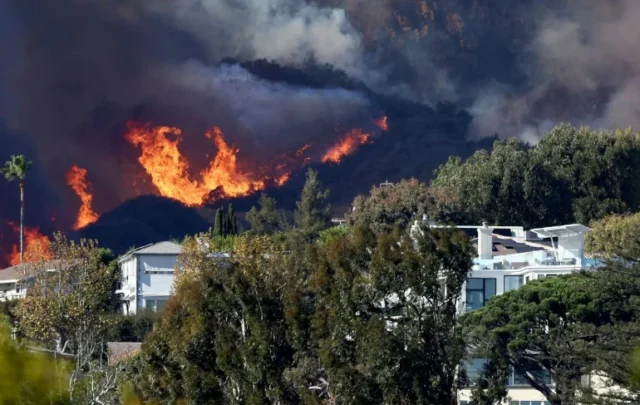Ed. note: You can find Parts 1, 2, 3 and 4 of this series on Resilience.org here, here, here and here.
When the IPCC mitigation report was published in late March 2022, a press conference was held to allow members of the media to ask questions about the report to the IPCC’s co-chairs. With the session’s final question, reporters asked “which political players have been the main obstacles to climate action and how must politics now change to enable the energy transition to occur?” An IPCC co-chair responded by saying “we’re trained to deflect questions like that,” and that the report’s coverage of politics and policy formation downplays obstruction and greenwashing. However, its authors do highlight some of the entities that have fought against climate policies and the methods they’ve used.
The report repeatedly observes that politics and power are actually vital considerations when analyzing the transition from fossil fuels to renewable energy:
- Technical Summary: “The interaction between politics, economics and power relationships is central to explaining why broad commitments do not always translate to urgent action.”
- Chapter 1: “Crucially, climate governance takes place in the context of embedded power relations, operating in global, national and local context. Effective rules and institutions to govern climate change are more likely to emerge where and when power structures and interests favour action. However widespread and enduring cooperation can only be expected when the benefits outweigh the cost of cooperation and when the interests of key actors are sufficiently aligned. Investigating the distribution and role of hard and soft power resources, capacities and power relations within and across different jurisdictional levels is therefore important to uncover hindrances to effective climate governance.”
- Chapter 17: “Though the above work tends to downplay politics and business, others suggest that political economy should feature prominently in transitions. Some branches of political-economy research underline how resource-intensive and fossil-fuel industries leverage their resources and positions to undermine transitions. These vested interests can lock in status quo policies in countries where political systems offer interest groups more opportunities to veto or overturn climate- or eco-friendly proposals. Companies with a strong interest in earning profits and building competitiveness from conventional fossil fuel-based energy systems have particularly strong incentives to capture politicians and agencies.”
- Chapter 17: “To date, the debate has had some obvious blind spots, not least considerations of power, politics and political economy. Certainly, the transition will create winners and losers, as well as stakeholders that can frame their economic interests so as to determine the orientation, pace, timing and scope of the transition.”
In addition to establishing power dynamics as a key determinant of climate action, the IPCC report examines those who have used their power to undermine the transition. There are no real surprises. “Fossil fuel industries have been important agenda-setters in many countries, including the USA, the EU, Australia, China, India, and Mexico, with differing positions and impacts across countries.” The authors note that “opposition to climate action by carbon-connected industries is broad-based, highly organized, and matched with extensive lobbying.” “Conservative foundations, sometimes financed by business revenues, have funded a diversity of types of groups, including think-tanks, philanthropic foundations, or activist networks to oppose climate policy.”
A few different methods have been used by economic elites to undermine the energy transition:
- Chapter 5: “A good number of corporate agents have attempted to derail climate change mitigation by targeted lobbying and doubt-inducing media strategies,” the authors write. The absence of any serious climate policy by the US federal government is a testament to the fossil fuel industry’s influence on the country’s political system.
- Chapter 13: Control over information systems and the public’s understanding of the climate crisis is another mechanism of power. “Who dominates the debate on media, and how open the debate can be varies significantly across countries based on participants’ material and technological power. Fossil fuel industries have unique access to mainstream media via advertisements, shaping narratives of media reports, and exerting political influence in countries like Australia and the USA. . . Accurate transference of the climate science has been undermined significantly by climate change counter-movements, particularly in the USA in both legacy and new/social media environments through misinformation, including about the causes and consequences of climate change.” “In the US, the oil industry has underpinned emergence of climate scepticism, and its spread abroad.”
- Chapter 5: A different approach has been to distract citizens from working together to elect a climate-conscious government by overemphasizing personal consumption choices as a climate solution. “Corporate advertisement and brand-building strategies also attempt to deflect corporate responsibility to individuals, and/or to appropriate climate care sentiments in their own brand building; climate change mitigation is uniquely framed through choice of products and consumption, avoiding the notion of the political collective action sphere.”
If we’re not thinking about how to undo corporations’ control over governments, no action will be taken at the scale of the climate crisis. “Overcoming the carbon lock-in is not simply a matter of the right policies or switching to low-carbon technologies. Indeed, it would mean a radical change in the existing power relations between fossil fuel industries and their governments and social structural behavior,” the report reads.
In order to develop enough power to overcome the obstacles presented by economic elites, everyday people need to build social movements. “Civil society social movements are a primary driver of social and institutional change.” They “frame grievances that resonate with society, mobilise resources to coordinate and sustain mass collective action, and operate within – and seek to influence – external conditions that enable or constrain political change. When successful, social movements open up windows of opportunity (so called ‘Overton Windows’) to unlock structural change.” Different chapters in the report highlight the importance of movement-building. “Collective action by individuals as part of social movements or lifestyle changes underpins system change,” the authors write. They point out that recent years have seen an “upsurge in climate activism.”
Several movements are mentioned:
- Chapter 4: The authors note “the growing movement for a ‘Green New Deal’—a roadmap for a broad spectrum of policies, programs, and legislation that aims to rapidly decarbonise the economy while significantly reducing economic inequality.”
- Chapter 5: “Indigenous resurgence (activism fuelled by ongoing colonial social and environmental injustices, land claims, and deep spiritual and cultural commitment to environmental protection) not only strengthens climate leadership in many countries, but also changes broad social norms by raising knowledge of Indigenous governance systems which supported sustainable lifeways over thousands of years.” Such knowledge may be crucial for establishing societies that respect ecological limits.
- Chapter 13: “Fridays for Future – the name of the group coordinating this tactic of skipping school on Fridays to protest inaction on climate change – has spread around the world. In March 2019, the first global climate strike took place, turning out more than one million people around the world. Six months later in September 2019, young people and adults responded to a call to participate in climate strikes as part of the ‘Global Week for Future’ surrounding the UN Climate Action Summit, and the number of participants globally jumped to an estimated six million people.”
- Chapters 1 & 17: The concept of degrowth “questions the sustainability and imperative of more growth especially in already industrialised countries and argues that prosperity and the ‘Good Life’ are not immutably tied to economic growth.” Not just a topic of academic research, “the degrowth movement, with its focus on sustainability over profitability, has the potential to speed up transformations using alternative practices such as fostering the exchange of non-monetary goods and services if large numbers of stakeholders want to invest in these areas.”
- Chapter 17: Fossil fuel divestment activists, who work to persuade investors to pull their funds out of fossil fuel companies and thereby undermine the industry’s social license to operate, are also recognized. “The divestment movement has the potential to disrupt current practices in the fossil-fuel industry, shape a ‘disruptive innovation’ and contribute to a strategy for decarbonising economies globally. Divestment is contributing to the political situation that is ‘weakening the political and economic stronghold of the fossil fuel industry.’”
What are the effects of these efforts so far? “Activist climate movements are changing policies as well as normative values. . . Environmental justice and climate justice activists worldwide have called attention to the links between economic and environmental inequities, collected and publicised data about them, and demanded stronger mitigation. Youth climate activists, and Indigenous leaders, are also exerting growing political influence towards mitigation.”
On one hand, the IPCC’s authors state that more research is needed to understand the climate impacts of today’s social movements. Yet they also observe that “Activism, including litigation, as well as the tactics of protest and strikes, have played a substantial role in pressuring governments to create environmental laws and environmental agencies.”
Despite the central role of the fossil fuel industry in undermining efforts to reduce emissions to date, it’s not just the financial interests of one industry on the line. The low energy demand scenarios that envision us keeping warming to 1.5°C without relying on unproven technologies while also achieving decent living standards for all find that these conditions are only possible “at near full equality” of energy use. In other words, it means capping the energy use of the wealthy at much lower levels than today. And the establishment of a non-growing economy could necessitate the same substantial level of redistribution of wealth as these studies suggest for energy use. All businesses would need to be reoriented around meeting basic needs rather than pursuing limitless profits. Creating a sustainable society appears to be a fundamentally anti-elite project, and when this becomes clear, elite opposition will very likely extend far beyond the fossil fuel industry.
Though the IPCC’s co-chair suggested that it’s not the report’s job to comment on politics, the reality is that addressing climate change is inescapably political. Some interests will be served at the expense of others. To not explore the efforts by fossil fuel executives and other elites to block climate policy would amount to taking a political side in their interest. It would also leave a critical barrier to action out of the analysis. Thankfully, the IPCC’s authors do acknowledge this repressive influence, note some of its methods, and recognize social movements as the vehicle for everyday citizens to overcome it. We’ll need a much deeper analysis of both elite opposition and the strategies and tactics employed by social movements, however, to effectively plan to overcome political barriers to the transition.






